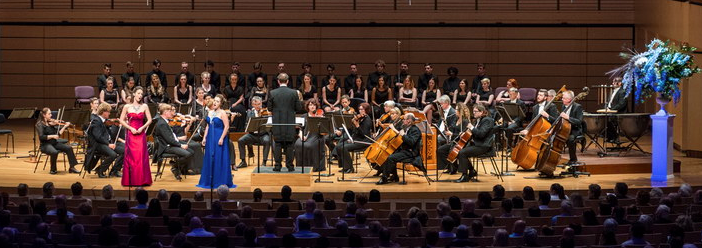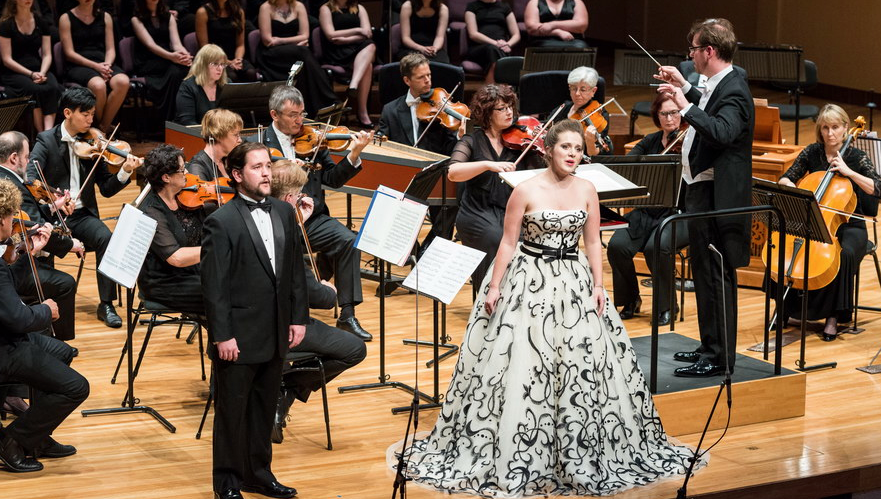Youth and beauty hold sway in this musical Handelian sweetshop.
Concert Hall, QPAC, Brisbane
April 11, 2015
It’s a credit to Leo Schofield and Jarrod Carland that sandwiched between the starry twin peaks of Max Emanuel Cenčić and the international cast of Faramondo they have found room for a host of home-grown Australian talent, some of it, on the face of last night’s concert of Handelian bonbons, both fresh-faced and bursting with energy. And don’t be deceived, the programme made up from 16 of Il Caro Sassone’s greatest hits may look simple enough, but none of these items are easy. It takes skill, judgment and a dash of star quality to pull most of them off.
The modest baroque-sized subset from the Queensland Symphony Orchestra under the sure hand of Oliver Gooch ensured that youth was matched by experience, delivering solid support to soloists and relishing their chances to shine via lively excerpts from the Water Music, the ubiquitious Queen of Sheba and Music for the Royal Fireworks (with real crackers at the end). Sweet duetting in the violins rubbed shoulders with perky oboes, a very nice solo bassoon and some red-hot brass.

The choral contribution came courtesy of The Australian Voices, whose fresh sound could certainly never be accused of stodginess. Young voices are always at a disadvantage pitted against the standard classical orchestra – a natural sound lacks the penetration gained by operatic vocal production – but what they lacked in power they made up for with discipline and commitment to message. Impressively singing from memory throughout, their conductor Gordon Hamilton had clearly taken time to talk them through what this music was actually about. Their engagement was total and saw them really ‘living’ through a piece like Zadok the Priest. In works like this that spotlight each section it was only the tenors that felt a bit light on sheer welly.
The evening fielded three young vocal soloists in some of Handel’s most famous arias and duets. Mezzo soprano Anna Dowsley (an opera Australia young artist who shone in last year’s Turk in Italy and as Siebel in the recent McVicar Faust) offered a series of unalloyed delights from a fine-spun Ombra Mai Fu (never as easy as it might seem) to Rinaldo’s loin-girding Venti, Turbini with its rollicking roulades and delicious gurgling bassoon obligato. I think I’ve said it before, but her rich, smooth voice is an absolute dream and nowhere was that shown more clearly than in Ariodante’s Scherza Infida, one of Handel’s most demanding slow arias. Entering into character from the first, her full, flexible voice sailed serenely over fluttering violins, plucked cello and bass and a baleful bassoon. So simple, yet so effective.

Bryony Dwyer is a Tasmanian-born soprano currently making a name for herself in Vienna and across Europe. No one could accuse her of being backward in her choices, setting off with a stunningly secure Let The Bright Seraphim. The exposed passages and demanding tessitura held no terrors and her agility matched the clarity of her vocal line, fearlessly negotiating runs and substantial leaps. She was matched inch for inch by a terrific performance on trumpet by Sarah Butler who decorated her da capo with elegance and ease. Morgana’s showstopping Tornami a Vagheggiar from Alcina was similarly despatched with style, her decorations tasteful without recourse to unnecessary stratospherics. A colleague of Dowsley from shared time at the Sydney Conservatorium, the two ladies had a delightful, natural rapport giving the love duet from Radamisto a cheeky Lesbian frisson.
Sadly the other soloist, Iain Henderson was not on good form. Jephtha’s Waft Her Angels is not to be tackled lightly. Its demands are considerable and from the opening the singer struggled with pitch made worse by our witnessing his realisation that it was all coming adrift. His light, bright tenor came into its own in Judas Maccabeus’s Sound an Alarm, gaining confidence as he was joined by full orchestra and offering some ringing top notes. But an easy top isn’t enough, and Jupiter’s famous Where’er You Walk from Semele was back to intonation troubles again and further cursed with little sense of mood or attention to text.
An attractive programme, nevertheless, and a timely reminder of Handel’s extraordinary hit rate – two hours of entertainment and not a forgettable tune in sight. It’s that facility for the (oh, so elusive) quality of memorability that puts him up there at the very top of the Baroque Premier League.











Comments
Log in to join the conversation.